Webinar Series on Peace in Mindanao: Part 1 - Japan's Full-scale Involvement in Peace in Mindanao, the Philippines
2021.03.22
On Feb. 10, 2021, the JICA Ogata Sadako Research Institute for Peace and Development (JICA Ogata Research Institute) held a Japanese-language webinar entitled “A Symposium on Peace and Development in Mindanao, the Philippines: All of Japan Weaving a Path to Peace (provisional translation).” This is the first part of a two-part webinar to discuss peacebuilding support provided in Mindanao by the Japanese government and JICA. The webinar was also to commemorate the publication of the 25th book in the “Project History” series, “Peace and Development in Mindanao, Republic of the Philippines—The Long Road to Peace through Trust.”
In his opening remarks, Makino Koji, deputy director of the JICA Ogata Research Institute, said that this will serve as an opportunity for us to listen to people who have committed themselves to the Mindanao peace process and think about how Japan should support peace.
The book's author, JICA staff member Ochiai Naoyuki, began by giving an overview of the conflict in Mindanao. He was posted to Mindanao for about five years as a member of the Mindanao International Monitoring Team (IMT) and a project leader for JICA. He explained that the conflict had been going on for more than 50 years, with the two groups—the Christian settlers to protect the new paradise they had worked hard for and the Muslims to protect their rights and ancestral land—fighting for their own justice. But it is not simply a conflict between Muslims and Christians, and has various aspects, such as feudal society and tribal conflicts, he said. Pointing to Japan's full-scale assistance to Mindanao since 2006, he said Japan has contributed to a peaceful resolution and continued peacebuilding through a multifaceted approach: diplomacy, by monitoring the peace negotiations; security, by dispatching personnel to the IMT, and development, through the assistance provided by JICA and NGOs.
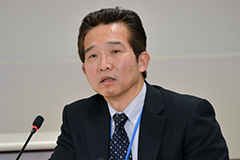
JICA staff member Ochiai Naoyuki, who was involved in the peacebuilding process in various capacities, gave an overview of the conflict in Mindanao
Next, Matsui Tomo, the executive director of the Mindanao Children’s Library, an NGO that has provided scholarship support and conducted storytelling activities for children in Mindanao for approximately 20 years, introduced efforts to use Japan’s Grant Assistance for Grassroots Human Security Projects (GGP) program to rebuild an elementary school in Bulanan in the province of North Cotabato, which is now attended by about 300 Muslim, Christian and indigenous children. “In Mindanao, originally, people lived in harmony, even if they were from different religions or tribes. Despite their differing faiths, the children would say, ‘We’re family.’ I want to bring back that peaceful, normal Mindanao,” Matsui said.
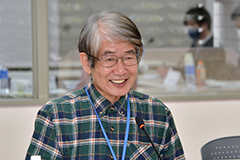
Matsui Tomo, executive director of the Mindanao Children’s Library, introduced efforts to rebuild an elementary school
Ishikawa Sachiko, a senior advisor at JICA, conducted an analysis of JICA’s efforts to support peace in Mindanao with the keywords “trust,” “the link between diplomacy and development,” and “backers of peace negotiations.” She explained that Japan has built trust with the Philippines through support over many years, and Japan's participation in the IMT in 2006 has helped to link diplomacy and development. She said that even when the peace process was suspended in 2008, and other countries had stopped providing support, Japan continued to provide assistance due to the strong will of the late Ogata Sadako, the president of JICA at the time, which boosted its credibility. She also noted that JICA was able to be a backer of the peace negotiations by supporting the creation of top-to-bottom vertical communication through measures such as organizing a series of seminars—together with Malaysian universities—for citizens to discuss what they could do to avoid losing their platform for the peace process.
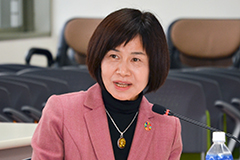
Ishikawa Sachiko, senior advisor at JICA, conducted an analysis of JICA’s efforts to support peace in Mindanao
Matsuo Hiromichi, deputy director of the Second Southeast Asia Division at the Ministry of Foreign Affairs, explained Japan's support for peace in Mindanao over the past 20 years. He said that in addition to its comprehensive support (Japan Bangsamoro Initiatives for Reconstruction and Development: J-BIRD), which concentrates on community development and personnel training, Japan has also served as a link between the Philippine government and the Moro Islamic Liberation Front (MILF), and in 2011, it served as mediator for the top-level meeting in Narita, Japan, between Philippine President Benigno Aquino III and MILF Central Committee Chairman Al-Haj Murad. “In the future, we will focus on improving the administrative capacity of Bangsamoro’s provisional autonomous government, encouraging socioeconomic development to deliver the benefits of peace to the people, and demilitarization,” he said.
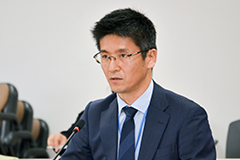
Matsuo Hiromichi, deputy director of the Second Southeast Asia Division at the Ministry of Foreign Affairs, explained Japan's support for peace in Mindanao
Honda Tomoaki, senior research fellow at the Canon Institute for Global Studies, said, “Japan has developed an approach to peacebuilding in Mindanao which differs from the approach adopted by the international community in conflict zones, such as Afghanistan. That is why it is so unique in having produced such results. I felt that the peacebuilding efforts led by JICA and the continued provision of ODA, have blossomed into peace in Mindanao. This peacebuilding model cannot and should not be applied directly to other conflict zones in exactly the same way. Perhaps we need to take a look at how to apply the model to other cases in the future.”
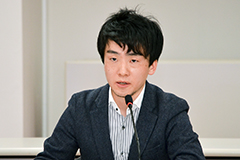
Honda Tomoaki, senior research fellow at the Canon Institute for Global Studies, pointed to Japan's approach which differs from those adopted by the international community
In response to this point, the panel discussion—moderated by Masuko Etsuko, division chief of the Research Program Division at the JICA Ogata Research Institute—shared a wide variety of ideas, including the importance of building relationships of trust with the parties involved in the conflict, mobilizing intermediate actors who connect people at the top and the bottom, such as regional councilors, scholars, and religious leaders, having an attitude of facing local voices with a clean slate and without any preconceptions, and getting the involved parties to have the desire not to carry the conflict on to the next generation.
Ochiai wrapped up the webinar by saying, "It is also Japan's role to convey its experience of the nation's development since the Meiji Restoration. In April 2021, I will be taking up a new post as an advisor to the chief minister of the Bangsamoro autonomous government. I would like to explore peace in Mindanao with all of you.”

事業事前評価表(地球規模課題対応国際科学技術協力(SATREPS)).国際協力機構 地球環境部 . 防災第一チーム. 1.案件名.国 名: フィリピン共和国.

事業事前評価表(地球規模課題対応国際科学技術協力(SATREPS)).国際協力機構 地球環境部 . 防災第一チーム. 1.案件名.国 名: フィリピン共和国.

事業事前評価表(地球規模課題対応国際科学技術協力(SATREPS)).国際協力機構 地球環境部 . 防災第一チーム. 1.案件名.国 名: フィリピン共和国.

事業事前評価表(地球規模課題対応国際科学技術協力(SATREPS)).国際協力機構 地球環境部 . 防災第一チーム. 1.案件名.国 名: フィリピン共和国.

事業事前評価表(地球規模課題対応国際科学技術協力(SATREPS)).国際協力機構 地球環境部 . 防災第一チーム. 1.案件名.国 名: フィリピン共和国.
scroll